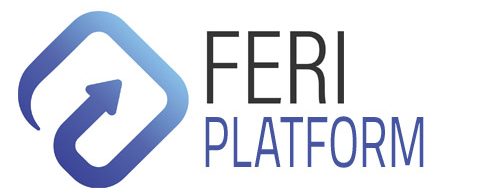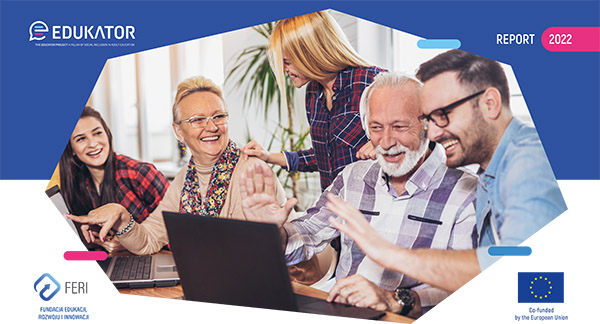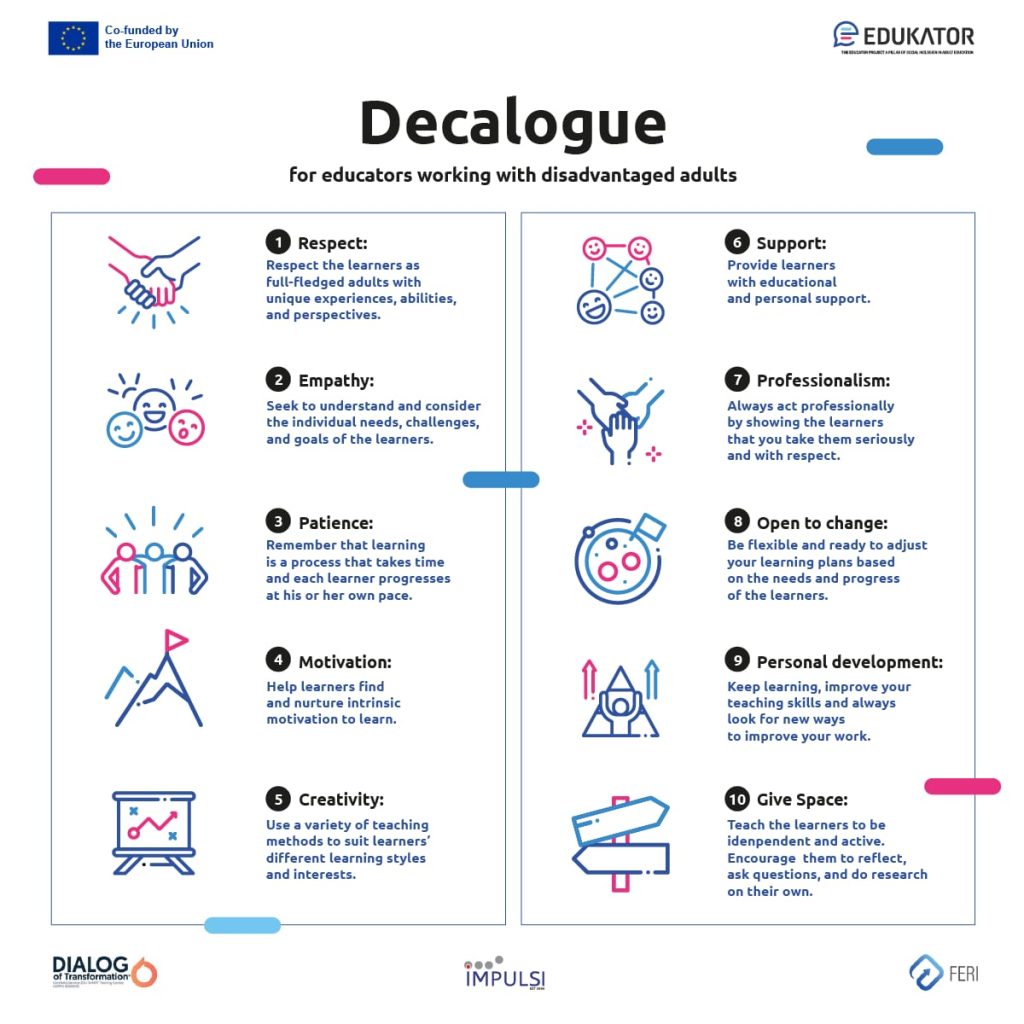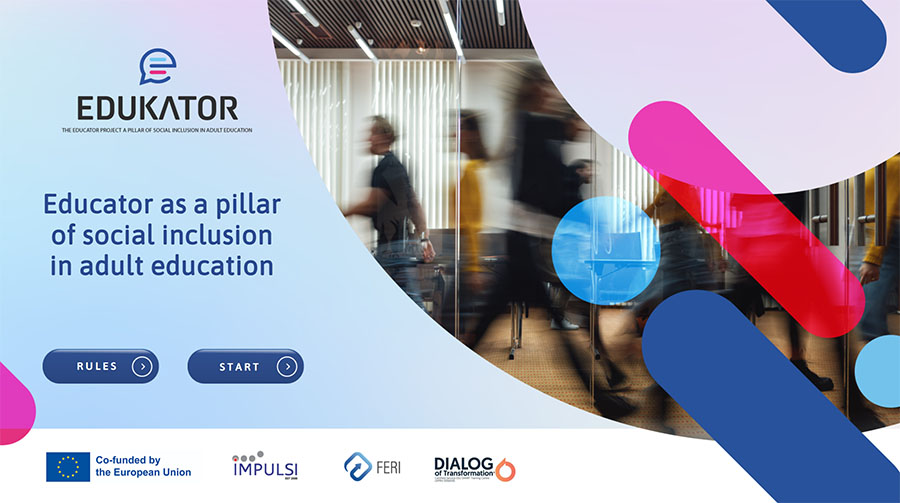
The educator is a pillar of social inclusion in adult education
Program: Erasmus+
Sector: Adult Education
Action 2. Cooperation for innovation and good practices
Project title: Educator as a pillar of social inclusion in adult education
Project number: 2021-1-PL01-KA220-ADU-000035239
Implementation period: 02/2022-01/2024
We are implementing the project in partnership with EDU SMART from Ireland and AESD from Romania.
Our project is inspired by two observations. Firstly, there is a clear need to increase social inclusion in the adult education sector, across Europe; and secondly, it is necessary to further support the professional development of educators who are often on the front line and who are responsible for improving social inclusion in adult education to a large extent.
For this reason, the project aims to improve social inclusion in adult education by increasing educators’ competences in reaching adults, motivating them to start and continue learning, and providing advisory support to put them on the path of lifelong learning.
TASK 1: Description of competences of educators of people with fewer opportunities
It will be prepared based on the market qualifications model in the Polish Qualifications Framework.
Experts will focus on learning outcomes in the area of KNOWLEDGE, SKILLS AND SOCIAL COMPETENCES.
First, an analysis of existing data (national – PL, RO, IE and European) will be carried out. Its aim is to clarify the state of knowledge regarding the importance of the role of the educator in improving social inclusion in adult education. The analysis will also help prepare the discussion for EPALE. The partners also decided to consult the assumptions of the competence description with their clients – people with fewer opportunities.
- ANALYSIS OF EXISTING DATA The analysis of existing data will be prepared by all partners. It will include: analysis of national documents (PL, RO, IE), good practices from Ireland, experience of institutions such as AONTAS, SOLAS and NALA (agencies dealing with adult education in Ireland), materials available on EPALE, studies by OECD, Eurydice, Cedefop , recommendations of EAEA and LLLPlatform and the working group on adult learning Education and Training 2020, Result Description reports (including: needs analysis, target groups, elements of innovation, expected impact and transferability potential) and the results of the work of expert networks. Each partner will be responsible for collecting and analyzing national data in order to share the results during the workshops. The leader will focus on European materials.
- 2-day WORKSHOPS Experts with experience in developing competency descriptions will prepare a competency description based on the results of the analysis of existing data. The description of competences will be prepared in English.
- CONSULTATIONS The description of competences developed during the workshop will be discussed at EPALE (discussion) and also with people with fewer opportunities. Each partner will conduct a discussion at the national EPALE as well as consultations with people with fewer opportunities, in accordance with the methodology defined at the time of the above-mentioned. workshop.
- PREPARATION OF THE FINAL VERSION OF THE DESCRIPTION OF COMPETENCES (0.5-DAY WORKSHOPS) Partners’ experts will meet again to analyze the comments submitted by the EPALE community and people with fewer opportunities. They will complete this work during a 0.5-day workshop conducted remotely. Additionally, as part of the description of competences, a self-assessment survey for educators will be prepared. Together with the development of the final version of the competency description, the Leader will prepare a report on the description preparation process.
TASK 2: EDUCATIONAL MATERIALS FOR EDUCATORS OF ADULTS WITH FEWER OPPORTUNITIES
The materials will provide significant support in building the competences of educators and the potential of educational institutions in reaching and supporting people with fewer opportunities. They will be prepared in accordance with the best standards, taking into account the specificity of adult learning. Their advantage is the close connection with the description of competences, the creation of a self-assessment survey and modules. This gives educators the opportunity to diagnose what knowledge and skills they have, systematize what they already know and what they still lack when it comes to working with people with fewer opportunities. This will allow you to select only those training modules that are actually needed.
Making the materials available in English on a dedicated website will facilitate access to them for all interested parties. Work on educational materials was divided into:
- DEVELOPMENT OF MATERIALS The materials will be prepared based on the best standards. I will also take into account the specificity of adult learning and their needs. The topics of the modules are exemplary and result from the partners’ experiences. The final modules will be determined after developing the description of competences, but they will include at least: 1) METHODS OF REACHING ADULTS WITH LOWER OPPORTUNITIES 2) METHODS AND TECHNIQUES OF WORKING WITH ADULTS WITH LOWER OPPORTUNITIES 3) TOOLS TO MOTIVATE PERSONS WITH LOWER OPPORTUNITIES TO LEARN LONG-LONG LIFE
Each MODULE will consist of:
- 3 podcasts – material in the form of introductory lectures to the module (1 podcast as intro to Result Description (including: needs analysis, target groups, elements of innovation, expected impact and transferability potential)
- 1 thematic multimedia presentation
- 20 worksheets/individual cards
- 4 case studies
- 2 infographics
- 2 lesson plans
The result of the intellectual work will include: 1 manual for the trainer, 9 podcasts, 3 multimedia presentations, 60 worksheets, 12 case studies, 6 infographics, 6 lesson plans.
- TESTING OF EDUCATIONAL MATERIALS Partners will prepare testing training. 10 educators will take part in it (two educators referred by partners and four educators who have not cooperated with partners or participated in Erasmus+ projects so far). The selection of educators will be based solely on substantive criteria, level of motivation and readiness to engage.
- PREPARATION OF THE FINAL VERSION OF MATERIALS
Individual topics of the blocks will be the result of the experts’ work and may change in relation to the framework design proposal.
- WORKSHOP SCENARIO – Secrets of working effectively with adults in stressful circumstances [PDF] | [FLIPBOOK]
- PRESENTATION – Stress in the area of adult education [PDF] | [FLIPBOOK]
- PRESENTATION – Staying motivated and engaged when working with adults under stress [PDF] | [FLIPBOOK]
- PRESENTATION – Time and priority management when working with adults under stress [PDF] | [FLIPBOOK]
- CASE STUDY 1 [PDF] | [FLIPBOOK]
- CASE STUDY 2 [PDF] | [FLIPBOOK]
- CASE STUDY 3 [PDF] | [FLIPBOOK]
- PODCAST 1 – The key to success and effectiveness: Coping with stress in adults [PDF] | [FLIPBOOK] | [AUDIO]
- PODCAST 2 – Masters of time management – one of the skills of coping with stress [PDF] | [FLIPBOOK] | [AUDIO]
- PODCAST 3 – STRESS – Introduction to the topic [PDF] | [FLIPBOOK] | [AUDIO]
- WORK CARD 1 [PDF] | [FLIPBOOK]
- WORK CARD 2 [PDF] | [FLIPBOOK]
- WORK CARD 3 [PDF] | [FLIPBOOK]
- WORK CARD 4 [PDF] | [FLIPBOOK]
- WORK CARD 5 [PDF] | [FLIPBOOK]
- WORK CARD 6 [PDF] | [FLIPBOOK]
- WORK CARD 7 [PDF] | [FLIPBOOK]
- WORK CARD 8 [PDF] | [FLIPBOOK]
- WORK CARD 9 [PDF] | [FLIPBOOK]
- WORK CARD 10 [PDF] | [FLIPBOOK]
- INFOGRAPHIC – Types of stress [PDF] | [FLIPBOOK]
- Professional burnout in the work of an educator [PDF] | [FLIPBOOK]
- WORKSHOP SCENARIO – NEW COLLABORATION – Group Dynamics Model [PDF] | [FLIPBOOK]
- PRESENTATION – NEW COLLABORATION Group Dynamics Model [PDF] | [FLIPBOOK]
- CASE STUDY 1 – NEW COLLABORATION – Group Dynamics Model [PDF] | [FLIPBOOK]
- CASE STUDY 2 – NEW COLLABORATION – Group Dynamics Model [PDF] | [FLIPBOOK]
- PODCAST 1 – NEW COLLABORATION – Group Dynamics Model [PDF] | [FLIPBOOK] | [AUDIO]
- PODCAST 2 – NEW COLLABORATION – Group Dynamics Model [PDF] | [FLIPBOOK] | [AUDIO]
- PODCAST 3 – NEW COLLABORATION – Group Dynamics Model [PDF] | [FLIPBOOK] | [AUDIO]
- WORK CARD 1 – Pre-reflection of participants [PDF] | [FLIPBOOK]
- WORK CARD 2 – The five stages of team development [PDF] | [FLIPBOOK]
- WORK CARD 3 – The role of the group leader in building participants’ commitment and motivation [PDF] | [FLIPBOOK]
- WORK CARD 4 – Benefits of regular practice of team engagement building techniques [PDF] | [FLIPBOOK]
- WORK CARD 5 – Various exercises [PDF] | [FLIPBOOK]
- WORK CARD 6 – Various exercises [PDF] | [FLIPBOOK]
- WORK CARD 7 – Various exercises [PDF] | [FLIPBOOK]
- WORK CARD 8 -Disadvantaged groups [PDF] | [FLIPBOOK]
- WORK CARD 9 – Group atmosphere [PDF] | [FLIPBOOK]
- WORK CARD 10 – Post-reflection of participants [PDF] | [FLIPBOOK]
- INFOGRAPHIC – CHALLENGING GROUP BEHAVIOURS [PDF] | [FLIPBOOK]
- WORKSHOP SCENARIO – Innovative approaches to education and development of work with disadvantaged adults [PDF] | [FLIPBOOK]
- PRESENTATION – Innovative approaches to education and development of work with disadvantaged adults [PDF] | [FLIPBOOK]
- CASE STUDY 1 – OSLOMET [PDF] | [FLIPBOOK]
- CASE STUDY 2 – BUSINESS SCHOOL OF EASTERN FINLAND (UEF) [PDF] | [FLIPBOOK]
- PODCAST 1 – INTRODUCTION [PDF] | [FLIPBOOK] | [AUDIO]
- PODCAST 2 -Techniques and tools of group activation, such as integration games, communication exercises, team exercises. Gamification. [PDF] | [FLIPBOOK] | [AUDIO]
- PODCAST 3 – Highlighting the most important conclusions and recommendations for educators working with disadvantaged adults. [PDF] | [FLIPBOOK] | [AUDIO]
- WORK CARD 1 – Concepts and principles of an innovative approach to adult education [PDF] | [FLIPBOOK]
- WORK CARD 2 – The process of designing educational programmes [PDF] | [FLIPBOOK]
- WORK CARD 3 – Innovative methods and techniques in working with disadvantaged adults [PDF] | [FLIPBOOK]
- WORK CARD 4 – Advantages and benefits of using innovative methods and techniques [PDF] | [FLIPBOOK]
- WORK CARD 5 – Examples of using innovative methods and techniques in working with disadvantaged adults [PDF] | [FLIPBOOK]
- WORK CARD 6 – Examples of using motivational tools and techniques in working with disadvantaged adults [PDF] | [FLIPBOOK]
- WORK CARD 7 – Examples of using specific tools and techniques to actively engage participants and increase the dynamics of a group in working with disadvantaged adults [PDF] | [FLIPBOOK]
- WORK CARD 8 – Disadvantaged groups [PDF] | [FLIPBOOK]
- WORK CARD 9 – Commitment and positive atmosphere in the group [PDF] | [FLIPBOOK]
- WORK CARD 10 – Diversity and social inclusion [PDF] | [FLIPBOOK]
- INFOGRAPHIC – Diversity and inclusion what is it? [PDF] | [FLIPBOOK]
- WORKSHOP SCENARIO – How to work with and control the concentration of disadvantaged adults [PDF] | [FLIPBOOK]
- PRESENTATION – How to work with and control the concentration of disadvantaged adults [PDF] | [FLIPBOOK]
- CASE STUDY 1 – Concentrate! [PDF] | [FLIPBOOK]
- CASE STUDY 2 – Building concentration of disadvantaged adults [PDF] | [FLIPBOOK]
- CASE STUDY 3 – Impact of concentration skills in the life of an adult – the role of an educator [PDF] | [FLIPBOOK]
- PODCAST 1 – Concentration in a dynamic world: Building effective concentration skills in adults [PDF] | [FLIPBOOK] | [AUDIO]
- PODCAST 2 – The key to success and efficiency [PDF] | [FLIPBOOK] | [AUDIO]
- PODCAST 3 – Overcoming barriers to building concentration in disadvantaged adults: Inspiring examples and valuable experiences [PDF] | [FLIPBOOK] | [AUDIO]
- WORK CARD 1 – SENSE AWARENESS [PDF] | [FLIPBOOK]
- WORK CARD 2 – FOCUS! [PDF] | [FLIPBOOK]
- WORK CARD 3 – BUILDING CONCENTRATION ON TRAINING [PDF] | [FLIPBOOK]
- WORK CARD 4 – CONCENTRATION MAP – WAYS OF DEALING WITH DIFFICULT SITUATIONS [PDF] | [FLIPBOOK]
- WORK CARD 5 – STRESS – A DANGER TO OUR CONCENTRATION [PDF] | [FLIPBOOK]
- WORK CARD 6 – VICE PRESIDENT EXERCISE [PDF] | [FLIPBOOK]
- WORK CARD 7 – TOGETHER [PDF] | [FLIPBOOK]
- WORK CARD 8 – CONCENTRATION – ACTIVE LISTENING [PDF] | [FLIPBOOK]
- WORK CARD 9 – CONCENTRATION HERE AND NOW [PDF] | [FLIPBOOK]
- WORK CARD 10 – CONSCIOUS BEATHING – CONCENTRATION [PDF] | [FLIPBOOK]
- WORK CARD 11 – MEDITATION [PDF] | [FLIPBOOK]
- INFOGRAPHIC – CONCENTRATION ADULTS [PDF] | [FLIPBOOK]
- WORKSHOP SCENARIO – Feedback in Traditional and Online Training [PDF] | [FLIPBOOK]
- PRESENTATION – Feedback in Traditional and Online Training [PDF] | [FLIPBOOK]
- CASE STUDY 1 – LearnPro – Advancing Professional Development Through Continuous Assessment and Feedback [PDF] | [FLIPBOOK]
- CASE STUDY 2 – Improving Digital Skills in Nonformal Adult Training [PDF] | [FLIPBOOK]
- PODCAST 1 – Five aspects of Formative Feedback to enhance learning results of disadvantaged group of people [PDF] | [FLIPBOOK] | [AUDIO]
- PODCAST 2 – The importance of Effective Feedback in Adult Education and Key elements [PDF] | [FLIPBOOK] | [AUDIO]
- PODCAST 3 – Types of Feedback in Adult Education [PDF] | [FLIPBOOK] | [AUDIO]
- WORK CARD 1 – The Purpose of Feedback [PDF] | [FLIPBOOK]
- WORK CARD 2 – Summative vs Formative Feedback [PDF] | [FLIPBOOK]
- WORK CARD 3 – Best Practices for delivering formative feedback [PDF] | [FLIPBOOK]
- WORK CARD 4 – Challenges and Solutions [PDF] | [FLIPBOOK]
- WORK CARD 5 – Challenges and Solutions [PDF] | [FLIPBOOK]
- WORK CARD 6 – Role of Technology in Feedback Delivery [PDF] | [FLIPBOOK]
- WORK CARD 7 – Strategies for Maintaining Personal Connections [PDF] | [FLIPBOOK]
- WORK CARD 8 – Strategies for assessing effectiveness of feedback [PDF] | [FLIPBOOK]
- WORK CARD 9 – Strategies for assessing effectiveness of feedback [PDF] | [FLIPBOOK]
- WORK CARD 10 – Strategies for assessing effectiveness of feedback [PDF] | [FLIPBOOK]
- WORK CARD 11 – My Action Plan [PDF] | [FLIPBOOK]
- INFOGRAPHIC – Online vs. traditional training [PDF] | [FLIPBOOK]
- WORKSHOP SCENARIO – BUILDING A TRAINING USING AVAILABLE APPLICATIONS AND ONLINE TOOLS [PDF] | [FLIPBOOK]
- PRESENTATION – BUILDING A TRAINING USING AVAILABLE APPLICATIONS AND ONLINE TOOLS [PDF] | [FLIPBOOK]
- CASE STUDY 1 – Tech Support Call [PDF] | [FLIPBOOK]
- CASE STUDY 2 – Team Building Activity [PDF] | [FLIPBOOK]
- PODCAST 1 – Basic layout rules: 5/5/5 rule [PDF] | [FLIPBOOK] | [AUDIO]
- PODCAST 2 – Basic Rules of Adult Learning [PDF] | [FLIPBOOK] | [AUDIO]
- PODCAST 3 – What is competence and how to develop it as a basis for defining training objectives [PDF] | [FLIPBOOK] | [AUDIO]
- WORK CARD 1 – Assessing Training needs [PDF] | [FLIPBOOK]
- WORK CARD 2 – Conclusions from the analyses [PDF] | [FLIPBOOK]
- WORK CARD 3 – Determining the purpose of the training [PDF] | [FLIPBOOK]
- WORK CARD 4 – Determining the content of the training [PDF] | [FLIPBOOK]
- WORK CARD 5 – Role-Playing Exercise: „Adapting Language to Diverse Audiences” [PDF] | [FLIPBOOK]
- WORK CARD 6 – Create [PDF] | [FLIPBOOK]
- WORK CARD 7 – Template of the evaluation of the training (in written form) [PDF] | [FLIPBOOK]
- WORK CARD 8 – Template of the certificates for participants [PDF] | [FLIPBOOK]
- WORK CARD 9 – Defining difficult participants [PDF] | [FLIPBOOK]
- WORK CARD 10 – Scenarios on dealing with difficult participants [PDF] | [FLIPBOOK]
- INFOGRAPHIC – The Decalogue of Creating Training [PDF] | [FLIPBOOK]

All results developed within the framework of this project are made available under open licenses (CC BY-SA 4.0 DEED). They can be used free of charge and without restrictions. Copying or processing these materials in whole or in part without the author’s permission is prohibited. If the results are used, it is necessary to mention the source of funding and its authors.





